Publications
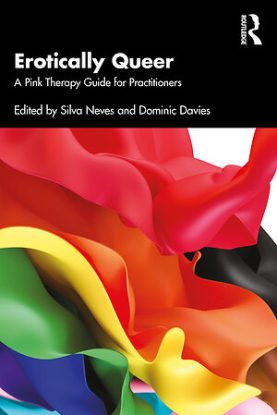
Erotically Queer: A Pink Therapy Guide for Practitioners
Edited by Silva Neves and Dominic Davies
Erotically Queer is a practice guide for clinicians, bringing together experts in their field with pioneering topics within GSRD (gender, sex and relationship diversity).
Chapters cover an array of topics rarely discussed in either clinical or popular literature including lesbian sex, queer menopause, bisexuality, working with shame, the sex lives of asexuals, sexuality and transgender people, treating anodyspareunia, compulsive sexual behaviours and chemsex. It also helps practitioners reflect on their biases regarding BDSM/kink and understand more regarding non-pathologising practices with intersex people.
The book aims to help all clinicians work more effectively with the Queer population, with the most contemporary sexological knowledge.
"This volume adds to the existing Pink Therapy series by expanding the resources available for practitioners working with GSRD people across often challenging and, for some, controversial topics. The volume encompasses scenarios presenting in contemporary practice that are readily accessible for clinicians seeking knowledge from experienced practitioners. A clear message is that despite initially daunting and complex presentations, the volume provides authoritative practical pathways from top-notch experts to assist in identifying solutions within a competence informed therapeutic process."
Kevan Wylie, MD FRCP FESCM. Past President, World Association For Sexual Health
"It takes a while to acknowledge our biases and prejudices if we ever reach that point. Yet unchecked, we might think of providing the best service to our clients. ‘Erotically Queer’ questioned me: am I genuinely open to diversity? Through which lenses am I seeing my clients? When you come across such a book, you will know how much you commit to inclusivity and are brave to challenge your mindset constantly. It remains on my nightstand, as one reading is not enough."
Francesca Tripodi, Director, International Online Sexology Supervisors (IOSS)
"Erotically Queer, is a new volume of the Pink Therapy series, which brings together contributions from experts in the GSRD therapy field. Each chapter benefits from having the unfiltered and unique voice of the author as they take the reader on a rich and vibrant journey. This is an outstanding volume that is essential reading for all therapist at every level of experience whether in general or psychosexual practice."
Jo Coker, AccCOSRT(Sen) AccCOSRT (Sup) MBPsS FCOSRT. HCPC Counselling Psychologist. Professional Standards Manager COSRT
Relationally Queer: A Pink Therapy Guide for Practitioners
Edited by Silva Neves and Dominic Davies
Relationally Queer explores diverse intimate relationship styles and the connections with self for clinicians interested in gender, sex and relationship diversity.
Offering readers a more inclusive and queer-friendly way of thinking about relationships, the book covers a range of topics that include intersectionality, consensual non-monogamy, working with shame, intimate partner violence, religious identities, and living with HIV. Exploring beyond a Eurocentric perspective, the book features a chapter on African-centred therapy and also includes the relationships of often erased populations such as bisexual people, sex workers, people with chronic health issues and trans people.
The book will help psychosexual and relationship therapists, counsellors and psychologists who work with clients of diverse genders, sexualities and relationships.
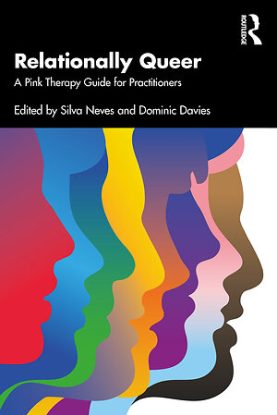
"This volume is a must have for affirmatively working with queer clients and their relationships of today and tomorrow. Relationally Queer is as ground breaking to the psychotherapy field as earlier volumes of the Pink Therapy series. Chapters address areas ranging from challenging monogamism to counselling people who sex work to addressing health issues—and more! A thoughtful overview of the gender, sex, and relationship diversities (GSRD) framework is also provided."
Markie L.C Twist, PHD, LMFT, LMHC, CSE-S, Teaching Faculty, Antioch University New England; Editor-in-Chief, Sexual and Relationship Therapy
"Having trained relationship therapists -globally- for decades GRSD is of great value to me: it recognises defines and positions a wide range of relationship expressions as either including everyone (and especially indigenous groups) or to stand accused of perpetuating colonialism. This work hits the spot and I commend the authors for this ground breaking, courageous work. I am particularly excited by the chapters on collectivist communities (African, Jewish, Muslim et al) in which individualist psychotherapy models have limited value"
Bernd Leygraf, Consultant Psychotherapist, CEO Naos-Institute (www.naos-institute.com and www.psychosexualtraining.org.uk )
"Relationally Queer is THE book that all GSRD specialists (including mental health professionals in training) are waiting for. The publication fills in the gaps in existing writings on the topic. It not only gives a fresh perspective of how to talk about and talk to GSRD clients but also how to include practical tools into the therapeutical space. The importance of perspective "nothing about us without us" can help us create safer environment and change the world."
Agata Loewe-Kurilla, PhD, Psychotherapist, Sexologist, Sexospher and tutor. Founder of Sex Positive Institute
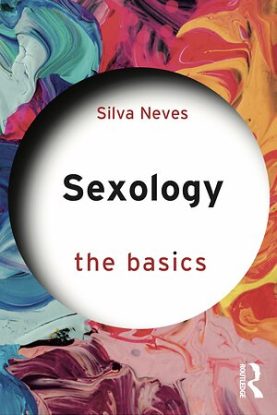
Sexology: The Basics
Silva Neves
Sexology: The Basics is the contemporary manual of human sexuality, eroticism, and intimate relationships. It takes you to every corner of the human erotic mind and physiological arousal response for a thorough understanding of all the functional parts of our sexualities, including how we bond, love and have sex from a broad perspective of diversities in sex, gender, and relationships, from monogamy to polyamory, Vanilla to Kink. This book bridges the gaps in our knowledge of sex education.
It is the ultimate guide to answering all the questions you never dared to ask, whether you are a student or a professional, or want to make sense of our often confusing erotic world.
"Sexology: The Basics is a wonderful introduction to what we know about sex from research, theory, and therapeutic practice. Packed full of interesting facts, thoughtful reflection, and real-world examples, Silva has done a brilliant job of gathering together current knowledge and presenting it in a super accessible and engaging form. Each chapter ends with helpful questions we can ask ourselves, and signposts for how we can find out more. An inclusive and entertaining read, that highlights the diversity of sexual identities, desires, practices, and more."
Meg-John Barker, author of Sexuality: A Graphic Guide
"This book is a positive, normalising and informative contribution to us all learning more about sexology. Silva clearly explains the biopsychosocial approach to sexology with all of the moving parts that contribute to our sexual wellness. It offers context, both historical and current, explaining the current sexual and relationship landscape we live in today. Silva asks us to consider our own biases and position as a reader, in order to be more informed as professionals."
Kate Moyle, EFS & ESSM Certified Psycho-Sexologist & Host of Podcast: The Sexual Wellness Sessions
"This book is an absolute triumph! Silva shares his clinical expertise in a way that feels so accessible, there's a rich array of information, all presented with kindness and enthusiasm. He covers a broad range of topics to provide foundational information about his field, as well as looking at the ways in which sex and relationships can play out in the wider context of our lives. A must read for everyone interested in the world of sexology."
Ruby Rare, author of Sex Ed: A Guide for Adults
"Not to be pigeonholed into one area of clinical sexology (his book on compulsive sexual behaviour is a best seller and core text on many courses), but he has produced another fine book within a year of publication. I loved the breadth of content and the clarity and ease of approaching contemporary sexology. Still, most of all, I enjoyed the case vignettes which beautifully illustrate his key concepts."
Dominic Davies, Psychotherapist, Sexologist and Founder, Pink Therapy
Compulsive Sexual Behaviours. A Psycho-Sexual Treatment Guide for Clinicians
Silva Neves
Compulsive Sexual Behaviours. A Psycho-Sexual Treatment Guide for Clinicians offers a unique approach to the struggles people face with their out-of-control sexual behaviours.
This comprehensive guide is deeply rooted in the science of sexology and psychotherapy, demonstrating why it is time to re-think the reductive concept of ‘sex addiction’ and move towards a more modern age of evidence-based, pluralistic and sex-positive psychotherapy. It is an important manual for ethical, safe and efficient treatment within a humanistic and relational philosophy.
This book will be an important guide in helping clients stop their compulsive sexual behaviours as well as for therapists to self-reflect on their own morals and ethics so that they can be prepared to explore their clients’ erotic mind.

"Silva Neves brings the understanding of compulsive sexual behaviors into the 21st century with a rigorous review of the past and latest literature and research. His argument that correct language dictates correct treatment is spot on and provides an exhaustive and comprehensive list of action steps for the initial assessment to ensure accurate assessment, diagnosis and treatment. His clinical examples bring all this to life through his clients. His plead for therapists to be not only sex positive but also pleasure positive is timely in a world that is missing proper sex education. I highly recommend this book."
Joe Kort, PhD is a sex and relationship therapist and co-Director of Modern Sex Therapy Institutes.
"Compulsive Sexual Behaviours is a much-needed book taking a sensible, critical, and pragmatic approach to the topic of 'sex addiction'. Silva's book offers an alternative model which puts pleasure, consent, and self-understanding at the heart of the therapeutic endeavour with people who struggle with their sexual behaviour. It contains everything you need to know about the theory and research in this area, plus a helpful and practical guide for practitioners about how to work around this theme with clients. The book is friendly, accessible, and engaging throughout, drawing pluralistically on relevant therapeutic and sexological approaches, and providing nicely inclusive examples of work with clients from across gender, sex, and relationship diversity."
Meg-John Barker, author of Sexuality: A Graphic Guide, Enjoy Sex, and The Psychology of Sex.
"This pioneering textbook for therapists provides a wonderfully creative set of tools and techniques for how to work with people who feel their sexual behaviour is compulsive or out of control. This is a timely book. Just as the World Health Organisation has decided to include, for research purposes, a new diagnostic category to try to help clinicians assist patients who are concerned with their sexual behaviours. I am delighted to recommend the first European textbook to tackle Compulsive Sexual Behaviour (CSB) from a sex-positive perspective. Informed as it is, by the latest sexual science into the neurobiology of sex, Neves also delivers a powerful critique of the sex addiction movement in the UK and beyond. However, he offers us much more than this. He packs this book with tools, theories and metaphors for understanding and working with CSB. It will become an invaluable treatment manual for sexologists to help them help their patients decode their erotic templates and work towards a holistic model of biopsychosocial sexual health."
Dominic Davies, Fellow National Council of Psychotherapists, Founder of Pink Therapy
"Silva Neves takes a modern perspective on the treatment of compulsive sexual behaviours that moves away from the traditional single framework ‘sex addiction’ model to a more pluralistic approach. He deals respectfully with the difference of opinion between professionals working within the field and clearly articulates for the reader the distinctions between addiction and compulsivity, as well as the clinical issues with applying the addiction model to treatment. At all times the welfare of his client is central to his thinking and the chapter on Ethics challenges us all to reflect on our thinking about ethics, sex and sexual behaviour. There is good coverage of assessment, formulation and treatment with excellent case studies to illustrate the process. Interventions are drawn from the field of sexology and utilise variety of psychotherapy modalities including a consideration of the Memorandum of Understanding on Conversion Therapy and the dangers the clinician faces in accidental conversion therapy. What shines through this book is Silva’s passion for his subject and his compassion for his clients. It is an excellent, clearly written book that is essential reading for experienced clinicians as well as those in training."
Jo Coker. COSRT Professional Standards Manager and Chair of the Professional Standards Board. HCPC Counselling Psychologist and a COSRT senior accredited psychosexual therapist, accredited clinical supervisor and accredited mediator. Fellow of COSRT.
"After years of study and clinical practice with the presenting issue of unwanted sexual behaviours, Silva Neves is clear that the sex addiction approach is inadequate. In this much needed book he refocuses the therapist to explore the client’s erotic template and the drivers behind their compulsivity, rather than on behavioural prevention. He offers a trauma informed, three phase treatment approach to the resolution of compulsivity, that honours the unique sexuality and sexual expression of the client. This book is a generous sharing of Silva’s experience with the evident intention to help its reader to provide a sexology informed, non-shaming service to clients presenting with the complex experience of sexual compulsivity. It is research based, contemporary, inclusive and pluralistic. It is a must read for all professionals working with the themes of sex, relationships, addiction and compulsion."
Julie Sale. Director of The Institute of Clinical Sexology. COSRT Senior Accredited Sex and Relationship Therapist and Supervisor. UKCP Registered and Accredited Psychotherapist
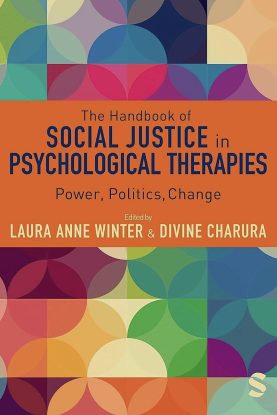
The Handbook of Social Justice in Psychological Therapies
Power, Politics, Change
Edited by Laura Anne Winter & Divine Charura
Are you looking for a psychological therapy textbook with social justice at its centre? Just can't seem to find a comprehensive textbook that aligns with your attitudes toward positive changes in psychological professions?
This three-part book sets out the core principles for social justice in the psychological therapies. In Part 1 you'll be introduced to Social Justice Theory in the psychological therapies, covering identity and intersectionality and integrating the psychological and socio-political.
In Part 2, you can expand on your knowledge with Social Justice informed therapeutic practice, which looks at the ways in which social class, race, disability, and other minoritised identities can inform therapeutic practice.
In Part 3, you will look Beyond the therapy room, and explore how to apply your social justice knowledge to clinical supervision, community psychology and other non-traditional therapeutic models.
Supported by a wealth of features including reflective and critical thinking questions, case studies, and recommended further reading resources, this book will help equip you with the knowledge, skills and attitude to work as a more socially conscientious practitioner.
Chapter contribution:
Chapter 12: Social Justice Informed Therapy and Sexuality
Queering Gestalt Therapy
An Anthology on Gender, Sex & Relationship Diversity in Psychotherapy
Edited By Ayhan Alman, John Gillespie, Vikram Kolmannskog
The first peer-reviewed book of its kind, this important volume addresses a current gap in the field of gestalt therapy: that the practice—and psychotherapy more broadly—still suffers from pervasive hetero- and cis-normativity.
This book offers gestalt-therapy-based research and training material on gender, sex, and relationship diversity (GSRD), including chapters on a variety of GSRD issues and how therapists can become more GSRD-sensitive. The contributors position themselves across the whole spectrum of GSRD and offer their voices as an invitation to further queer the gestalt community with diverse content ranging from academic, research-oriented pieces to experiential, reflective perspectives. Featured chapters explore topics including gender-radical clients, sex and sexuality, relationship diversity, integrating GSRD and gestalt therapy, and addressing heteronormativity in gestalt therapy training.
Queering Gestalt Therapy is for everyone who is interested in gender, sex, and relationship diversity, especially as they relate to gestalt therapy practice. This book will be especially useful for therapists, supervisors, coaches, and students of gestalt therapy.
Chapter contribution:
Chapter 9: Compulsive sexual behaviours: Moving beyond the frontiers of addiction thinking
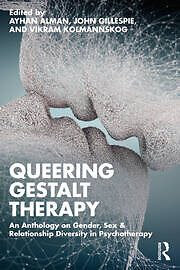
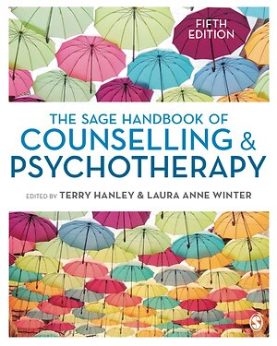
The SAGE Handbook of Counselling & Psychotherapy
Fifth Edition
Edited by Terry Hanley & Laura Anne Winter
The most comprehensive and accessible introduction to the field of counselling and psychotherapy for trainees and practitioners.
Chapter contributions co-authored with Dominic Davies:
Chapter 2.10: Sexuality
Silva Neves and Dominic Davies
Chapter 5.13: Gender, Sex and Relationship Diversity Therapy
Dominic Davies and Silva Neves
European Journal of Psychotherapy & Counselling
Contemporary psychotherapy: Evolution in our modern time
Silva Neves (2023) Contemporary psychotherapy: Evolution in our modern time, European Journal of Psychotherapy & Counselling, 25:1-2, 179-197, DOI: 10.1080/13642537.2022.2156148
To link to this article: https://doi.org/10.1080/13642537.2022.2156148
Working with LGBTQ+ people in our current society: Developing an anti-oppressive practice
Silva Neves (06 Feb 2025): Working with LGBTQ+ people in our current society: Developing an anti-oppressive practice, European Journal of Psychotherapy & Counselling, DOI: 10.1080/13642537.2024.2398999
To link to this article: https://doi.org/10.1080/13642537.2024.2398999
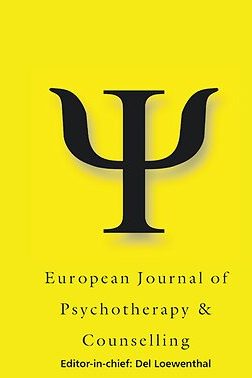
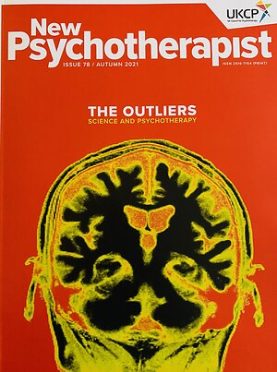
New Psychotherapist (UKCP)
Issue 78/ Autumn 2021)
Feature Article: Compulsive Sexual Behaviour: A Paradigm Shift.
Psychotherapists need to move away from thinking about compulsive sexual behaviour as an addiction towards a more humanistic and pluralistic framework.
Sexual and Relationship Therapy
International Perspectives on Theory, Research and Practice
The religious disguise in “sex addiction” therapy
Silva Neves (2021): The religious disguise in “sex addiction” therapy, Sexual
and Relationship Therapy, DOI: 10.1080/14681994.2021.2008344
To link to this article: https://doi.org/10.1080/14681994.2021.2008344
Queering the 7-eyed model of clinical supervision
Rima Hawkins & Silva Neves (2024): Queering the 7-eyed model of clinical supervision, Sexual and Relationship Therapy, DOI: 10.1080/14681994.2024.2403347
To link to this article: https://doi.org/10.1080/14681994.2024.2403347
Review: Kinky in the digital age
Silva Neves, (Reviewed by, ) (2023): Review: Kinky in the digital age, Sexual and Relationship Therapy, DOI: 10.1080/14681994.2023.2250997
To link to this article: https://doi.org/10.1080/14681994.2023.2250997
Review: Money Shot: the Pornhub Story Netflix documentary directed by Suzanne Hillinger
Silva Neves (2023): Review: Money Shot: the Pornhub Story, Sexual and Relationship Therapy, DOI: 10.1080/14681994.2023.2251006
To link to this article: https://doi.org/10.1080/14681994.2023.2251006
Film review: All Of Us Strangers
Silva Neves (2024): Film review: All Of Us Strangers, Sexual and Relationship Therapy, DOI: 10.1080/14681994.2024.2363245
To link to this article: https://doi.org/10.1080/14681994.2024.2363245
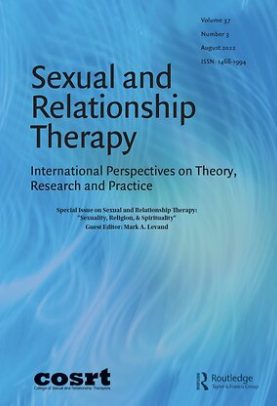
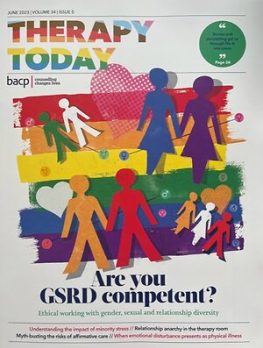
Therapy Today (BACP)
Are you GSRD competent?
Ethical working with gender, sexual and relationship diversity.
(Therapy Today. June 2023. Volume 34. Issue 5)
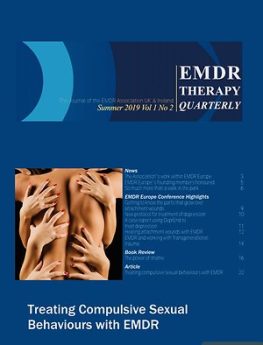
EMDR Journal
Treating compulsive sexual behaviours with EMDR
September 2019